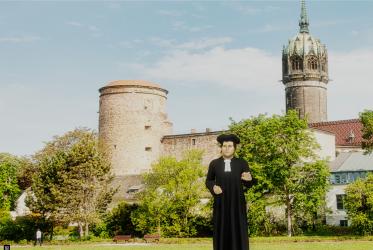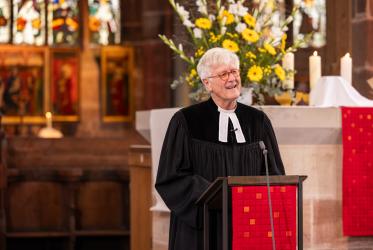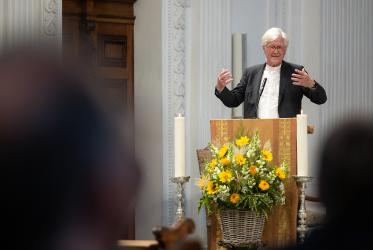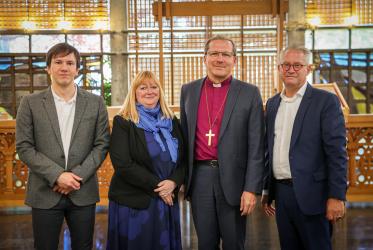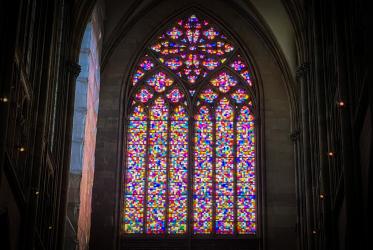The gathering, entitled “Philip Potter and the Ecumenical Movement: Milestones and Inspiration for Today,” was organized by the Mission Academy at the University of Hamburg in cooperation with the Ecumenical Salon.
Former World Council of Churches (WCC) general secretary Konrad Raiser, in his keynote address at the event, noted that Potter, who was general secretary of the WCC from 1972-84, was the first general secretary of the WCC from one of the churches of the global south.
“He embodied in his person the ‘change of perspective’ in the work of the WCC from an agenda driven by the issues and expectations of the historic churches in Europe and North America to the experiences and agenda of the churches in Asia, Africa, and Latin America, as well as those from the Pacific and the Caribbean,” said Raiser, who was WCC general secretary from 1993-2003 and previously worked alongside Potter as WCC deputy general secretary from 1973-1983.
Raiser emphasized how, for Potter, the focus for the ecumenical movement was God’s oikoumene, Greek for the “whole inhabited earth,” which embraces not only the churches but all of humanity and creation.
Raiser quoted from a lecture Potter gave in 2001 where Potter stated: “God’s economy is that justice and peace should become incarnate among human beings and that creation be cared for and preserved to be at the service of all. That is why we use the word oikoumene, ecumenical, to describe the movement in which the churches are seeking to make God’s economy known and effective in our world.”
Raiser underlined Potter’s belief in the power of love, something that went back to Potter’s attendance at the second World Conference of Christian Youth in Oslo in 1947, a turning point in Potter’s life that propelled him into the international ecumenical movement.
“As a result of his conversion experience in Oslo, he had consecrated his life to the lordship of Jesus Christ and thus placed it under the power of love,” said Raiser.
Raiser quoted another of Potter’s lectures on “The Love of Power or the Power of Love,” in which Potter stated: “Forgiving is the most searching test of the power of love. ‘Power’ as the capacity to do something new, unexpected, creative, as part of our inescapable relations with others, and ‘love’ as self-giving for others, are most signally manifest in forgiving.”
‘Calypso boy’ not afraid of conflict
In introductory remarks, Rev. Dr Anton Knuth, head of studies at the Mission Academy at the University of Hamburg, reflected that Potter’s whole life was connected with the ecumenical movement.
“From missions to mission was the title Philip Potter gave to this paradigm shift, for which he received an honorary doctorate from the theological department of the University of Hamburg as early as 1971,” said Knuth. “He was not only concerned with the credibility of a contradictory Christianity that had been discredited by apartheid, racism and bloc thinking, but also with the connection between social and personal liberation.”
Potter was born on 19 August 1921 in Dominica, often referring to himself as a “calypso boy" because he came from the Caribbean. “Some say the musicality of the Caribbean also shaped Potter's leadership style, for he was a master at initiating processes,” said Knuth. “For him, ecumenism consisted not only of joint declarations, but of concrete actions.”
When Potter was awarded an honorary doctorate in 1971, he was director of the World Council of Churches (WCC) Commission on World Mission and Evangelism. A year later, he was responsible for organizing a mission conference in Bangkok in 1972-73, which represented a departure from Eurocentric mission in favour of global and local mission. “And with what verve he advocated this!” exclaimed Knuth. “In the midst of the Vietnam War, Bangkok was probably one of the most remarkable mission conferences ever.”
One would sometimes wish for the same drive and courage for ecumenical conferences today, Knuth continued. “However, as is well known, the calls for a moratorium on missions made in the aftermath of the conference triggered sharp conflicts,” he said. “Potter became the target of all who accused the WCC of politicising ecumenism.”
Can we carry the power of love forward?
In a visible continuation of Potter’s legacy, symposium participants also reflected on how important Potter’s wisdom is in their daily lives of working for peace and justice through the global ecumenical movement.
Rev. Dr Fernando Enns, member of the WCC central committee and co-moderator of the reference group for the Pilgrimage of Justice and Peace, reflected on a key sentence he learned from Potter: “God needs all kinds of people!”
Enns and others remarked on how they still see themselves standing on Potter’s shoulders, and regard this as a privilege.
“Whenever we have controversies within our ecumenical family and I feel frustrated about some opinions expressed by others, this wisdom finds its way into my heart—and I am ever grateful for it,” said Enns, who recalled being present In a private meeting with Desmond Tutu and Potter in Hamburg in 2007.
“After praying together, they shared some of their experiences of past involvement in the ecumenical movement,” recalled Enns. “Until then, I had no idea about the pain they had to accept as black leaders of the global ecumenical movement.”
Enns said he also witnessed the importance of personal friendship. “Since then, I am more convicted than ever, that our ecumenical fellowship—a gift from the triune God—is felt most deeply in these personal friendships,” he said. “A lot of challenges of the time when Philip Potter was general secretary of the WCC are still on our agenda: economic injustice, racism, militarism, sexism, care for creation, among others.”
Enns also reflected on how the WCC Pilgrimage of Justice and Peace is bringing Potter’s legacy into the future of the ecumenical movement, including to the 11th WCC Assembly in Karlsruhe, Germany in 2022.
“It depends a lot on something, that Philip taught us: listening, giving, forgiving,” said Enns. “If this could be the attitude of the hosting churches in Germany, we will receive so many gifts from all the sisters and brothers who will be coming to Germany. If we, instead, think, that we should - once again - with our white privilege, colonial mindset, and economic strength, preach and teach the pilgrims, we might be disappointed in the end.”
"Philip Potter und die Dynamik der ökumenischen Bewegung", von Dr. Konrad Raiser
"Philip Potter and the momentum of the ecumenical movement", by Dr Konrad Raiser
To commemorate the life of Philip Potter, the WCC is organising a webinar “Prophet of God’s Oikoumene - a celebration of the life of Philip Potter,” on 23 August. Details and registration link here
The 2013 WCC publication, At Home with God and in the World; A Philip Potter Reader is available for free download
There is also a special free virtual issue of the WCC journals The Ecumenical Review and International Review of Mission: “Philip Potter: Prophet of God’s Oikoumene”


